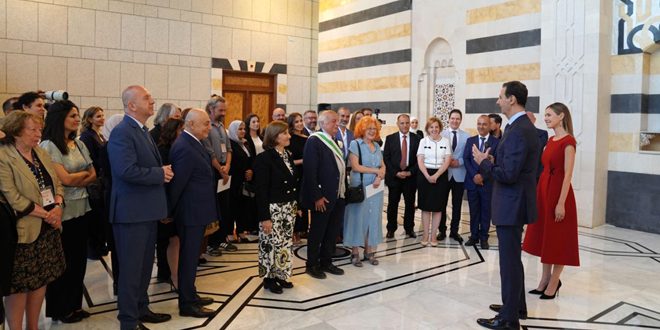President Al-Assad’s speech came yesterday when he and First Lady, Mrs. Asma Al-Assad, met with members of foreign missions and Syrian experts participating in the international conference held in Damascus on “the results of archaeological research and the repercussions of the earthquake in Syria.”
“The more we know about the history of one region, the more we know about other regions, because the world in the past was interconnected, and I believe that the world lived as one civilization, not different civilizations, perhaps one civilization with different cultures,” the president said.
He added: “Most of the problems we suffer from today are caused by our blindness to the past. When we are blind to the past, we do not understand the present. If we cannot understand the present, it is impossible for us to see the future. And when we do not see the future, we will face a big problem and destruction, as we see today.”
President Al-Assad continued: “I used to meet many politicians from all over the world, and I used to tell them: instead of sending soldiers, if you send part of the money you spend to create problems, for the sake of culture, you can change the world.”
He went on to say “we can fight extremism through culture. We can fight terrorism through culture and we can also fight wars through culture. The more wars multiply, the more we need culture. Antiquities and culture form an identity, and people in a society cannot be stable without an identity. This is what we realize through our war in Syria, because we have lost part of our identity as part of the identity is represented in the archaeological sites that you know, where they destroyed Palmyra, part of the Citadel of Aleppo, and many Syrian sites, which are truly world heritage, not just Syrian ones.
President al-Assad said: “Part of our war in Syria is not related to fighting. We do not fight with guns only, but rather we fight with culture. We fight by preserving identity. Identity cannot be preserved unless the archaeological sites are protected as the archeological sites integrated with the intangible heritage. You work in the field of tangible heritage, and we must complement that by working in the field of intangible heritage. In this way, we can achieve peace in Syria.”
President Al-Assad addressed the Italian archeologist Paulo Matthiae by saying: “You love Syria, and Syria loves you. For us, we see that Syria as a society, country, history and heritage are closely aligned with Paulo Matthiae. You are part of our identity and part of our heritage today.”
President Al-Assad saluted all the members of the foreign archaeological missions and said: “I thank each and every one of you for coming to Syria, and some of you for staying in Syria. We know that it was never easy for you to come, stay and be present in these difficult circumstances, as this area is a war zone.”
President Al-Assad concluded by saying: “When we talk about history and heritage, we cannot do that without mentioning the name of Syria.”
It is noteworthy that the reception came after awarding the Italian archeologist Paolo Mathiae, the discoverer of Ebla – the Syrian Order of Merit of Excellent degree in recognition of his work and achievements in favor of Syrian history and antiquities.

